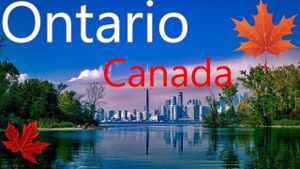Wales is gearing up to implement a new tax aimed at overnight visitors, which some are calling a "tourism tax." Introduced by the Welsh government, this proposed levy could see tourists paying for their stay to help support local communities and boost the economy.
The Visitor Accommodation (Register and Levy) Etc. (Wales) Bill, as it is officially called, is slated to potentially come to fruition as early as April 2027. If approved by all local councils, the tax could generate as much as £33 million annually. So, how does this tax work? Visitors staying overnight at hotels, Airbnb properties, or self-catering accommodations would be expected to pay £1.25 per person per night, whereas those staying at campsites or hostels would be charged a lesser fee of 75p.
Launching this type of levy is not new; similar taxes have been successfully implemented around the globe, from Greece to California, benefiting local economies and supporting tourism infrastructure. The money raised through these levies traditionally funds local services and tourism marketing, along with improvements to facilities enjoyed by guests.
According to Welsh Finance Secretary Mark Drakeford, the aim of this bill is to create fairness within the tourism sector—one of the major contributors to the Welsh economy. Drakeford stated, "Visitor levies are common around the world, benefiting local communities, tourists and businesses—and we want the same for Wales. Money raised through this levy would be retained by local authorities and reinvested back to support local, sustainable tourism. It’s a small contribution but could make a big difference." The funds are expected to provide necessary services, help sustain local infrastructure, and maintain the beauty and accessibility of the sites visitors cherish.
Alongside the tax itself, the proposed legislation also introduces the need for local authorities to establish and maintain registries of visitor accommodations—this would be the first official registry of its kind for Wales. The idea behind this registry is to create greater transparency within the industry and facilitate effective taxation. It will help the authorities keep track of who is operating within the tourism sector and where these properties are located, providing enhanced data for future policy-making.
Not all stakeholders agree with the proposed tax model, though. It has been met with considerable apprehension from various corners of the tourism sector. The Welsh Conservative Party argues vehemently against the proposed tax, worrying it could harm the very industry it seeks to support. They believe it will deter visitors from traveling to Wales and make trips more expensive for families, especially when compared with nearby England, where similar levies are not being introduced.
Peter Fox, the Shadow Minister for Finance and Local Government, voiced his concerns: "This tax is the wrong one for Wales and our tourism industry. Not only will it add significant costs to family holidays, but it could potentially drive visitors away, leading them to seek cheaper options elsewhere."
Critics like Rowland Rees-Evans, Chair of the Wales Tourism Alliance, express disappointment, believing the tax risks putting undue financial strain on businesses already grappling with competition from other tourist destinations. They argue it could result in diminished visitor numbers and affect local economies negatively. Rees-Evans also pointed out, "There seems to be no clear commitment to dedic bring the funds raised to amenities or improvements for visitors, which complicates the perceived value of the tax."
Supporters of the bill argue the need to pivot toward sustainable tourism practices, emphasizing the visitor levy as part of broader efforts to share the costs of maintaining local infrastructure with those who use it. Representatives within the tourism sector have called for collaboration with local authorities to discuss and potentially allocate the generated funds to profitable initiatives. Sufficient consultation with stakeholders would assure the funds raised contribute effectively to enhancing the visitor experience.
Supporters of the plan highlight the importance of investing carefully collected taxes back to benefit local communities, safeguarding not just tourist attractions and local culture but also reinstilling faith among the local population. This would surely provide guests with memorable Welsh experiences reflective of local spirit.
There are also conversations around exemptions. Certain long-term residents or individuals staying over 31 nights could be exempt from paying the tax. Also, those residing within shelters or temporary accommodations would not be charged, ensuring fair treatment for all visitors.
Wales’ focus on maintaining sustainable tourism aims to bridge the gap between the influx of visitors and the needs of local communities. If successful, this innovative model not only aims to protect Wales’ cultural and natural assets but also sets the stage for others worldwide to recognize the significance of sustainable tourism practices as part of localized economy-building efforts.
Whether the tourism tax will successfully navigate the political and economic hurdles remains to be seen, but for now, it certainly packs the punch of controversy and enthusiasm from all sides involved. The tourism industry embodies not just the money but also passion, culture, and community, all entwined with Wales’ rich history and promising future.
So, what happens next? If the legislation progresses through necessary committees and discussions, communities will have the chance to engage on the matter, offering their voices on whether they wish to see the tourism tax implemented or not—a situation where the locals' input on the levy could make all the difference.



